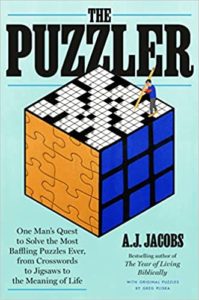Zoomorphic (zoh-uh-MOR-fik) means “having the shape, form, or likeness of an animal.” Example from Canyons of the Colorado by J.W. Powell: “In the mind of the savage, the world is populated by a host of mythic beings, anthropomorphic [with human characteristics] and zoomorphic.”
“Simplicity is the ultimate sophistication.” – Leonardo Da Vinci
How Much Do You Know About Hemingway?
I got a perfect score on this quiz from Quiz Daily. Of course, I’m a big Hemingway fan. And the questions were pretty obvious. How well will you do? Click here.

Sound of Metal
Released in theaters Nov. 20, 2020
Directed by Marius Marder
Starring Riz Ahmed and Olivia Cooke
Available on Amazon Prime
I came across this movie while surfing last week. I recognized the title – perhaps because it had been nominated in 2021 for several Academy Awards. The title led me to believe it was a documentary about the heavy metal music industry. But the description indicated otherwise.
Grim. Stark. And depressing. “Any time I see a movie described in those terms, I know I’m going to like it.” That’s what my old friend Ken Danz used to say. (RIP, Ken. His ashes sit beside a stack of reference books in my office.) He would have liked Sound of Metal.
And he wouldn’t have been alone. There are plenty of people that liked it when it was released in 2020.
For me, Sound of Metal was difficult to watch. So difficult, I watched it in three 45-minute segments.
What Was Difficult About It
* The subject matter: Addiction and disability.
* The plot: A recovering heroin addict finds salvation as a drummer in a heavy metal band, only to lose his hearing.
* The cinematography: It emphasized the grimness of the mood and starkness of the opportunities.
What I Liked About Sound of Metal
* It did not sugar-coat either of the issues: addiction or disability.
* The principal actor: He was mesmerizing.
* The actor that plays the head of the recovery center.
Interesting
* Along with CODA and Drive My Car, this is the third movie I’ve watched this year with deaf characters. Aside from Children of a Lesser God (1986), I can’t even remember seeing another movie that had anything to do with the deaf community.
* Sound of Metal, Marder’s feature debut, took more than a decade to produce. It was based on an unfinished documentary by Derek Cianfrance – Metalhead – about a heavy metal drummer with ruptured eardrums.
Critical Reception
* “A drama that’s as visceral and hard-hitting as its protagonist’s drum solos.” (Tara Grady, Irish Times)
* “A film that deserves to be seen by the widest possible audience, reminding us of cinema’s unique ability to challenge, entertain, uplift, and unite.” (Mark Kermode, Observer, UK)
* “The movie may be stylized, but it’s not ostentatious. Its universe feels lived in and authentic.” (Bilge Ebiri, New York Magazine)
* “For the most part, the heavy lifting of the film is left to Ahmed, and he handles it effortlessly, in a moving and unforced turn that, while characterized by moments of rage and destruction, is ultimately a journey of acceptance.” (Michael O’Sullivan, Washington Post)
You can watch the trailer here.

The Puzzler
By A.J. Jacobs
368 pages
Published Apr. 26, 2022 by Crown Publishing Group
If you like puzzles. Or English. Or humor. Or music. You may like this book. I liked it because it was chock full of interesting facts and worthy speculations about all of those things.
It’s a bathroom book. And by that I mean it can be enjoyed in short “sittings.”
The author, A.J. Jacobs, is what they call an “immersion journalist,” a writer that takes a year or so to explore an interesting topic and then recounts his experiences. He did it before with The Year of Living Biblically and Know It All. He calls them lifestyle experiments.
Here, the deep dive is puzzles. Crosswords, anagrams, rebuses, jigsaws, mazes, chess problems, math and logic, ciphers/secret codes, visuals (think “Where’s Waldo”), cryptics, riddles. He wants to know what makes them so satisfying.
He studies the history. He researches the data. He interviews the experts. He then spends countless hours trying to solve puzzles of every kind. And all the while, he speculates, humorously and sometimes philosophically, about why he’s spending his time doing this.
Here are a few bits from one section of the book, on Anagrams:
Anagrams were originally seen as divine hidden messages from the gods…. According to The Puzzle Instinct by psychologist Marcel Danesi, Alexander the Great once had a dream about a “satyr,” the mythical character that is half-man, half-goat. Alexander was troubled by the dream. What did it mean? He asked his soothsayers, who wisely pointed out that, in ancient Greek, the word for “satyr” is an anagram of “Tyre is yours.” (Tyre was a city Alexander’s army had surrounded.) Alexander took this as a green light from the gods. He invaded Tyre and made it his. Admittedly, Alexander might have found another excuse to invade if not for anagrams. He was a big fan of invading.
In the 17th century, King Louis XIII of France appointed a man named Thomas Billen to be his Royal Anagrammatist at a salary of 1,200 livres a year. Billen’s entire job was to fashion sycophantic anagrams, rearranging the letters in royal names to create flattering descriptions.
The Victorians also liked their obsequious anagrams. Lewis Carroll famously created this one out of Florence Nightingale: Flit on, cheering angel.
But anagrams can also be insulting. In 1936, The New York Times reported that mother-in-law is an anagram for Woman Hitler.
Critical Reception
* “[A] weirdly fascinating new book… a romp, both fun and funny. Jacobs explains, in a way I never could, how at various points in our lives puzzles can save us.” (The New York Times)
* “Humans are obsessed with puzzles, and A.J. Jacobs is obsessed with figuring out why. Of all the gifts he possesses as a writer, his second-greatest is his ability to make you think and make you laugh at the same time. In these delightful pages, you’ll find a clue about what his greatest gift might be.” (Adam Grant, author of Think Again and host of the TED podcast WorkLife)
* “A barrel of monkeys’ worth of fun.” (Kirkus Reviews)
* “Ridiculously entertaining.” (Booklist)
About A.J. Jacobs [bold]

A.J. Jacobs is a journalist and lecturer who has written four bestselling books – including Drop Dead Healthy and The Year of Living Biblically – that blend memoir, science, humor, and a dash of self-help. A contributor to NPR, The New York Times, and Esquire, among other media outlets, Jacobs lives in New York City with his family.
Click here to read an article he wrote about the joy of playing with words.
“If you talk to a man in a language he understands, that goes to his head. If you talk to him in his language, that goes to his heart.” – Nelson Mandela
Obsequious means fawning, deferential – i.e., attempting to win favor from influential people by flattery. As quoted in my book review, above: “The Victorians also liked their obsequious anagrams. Lewis Carroll famously created this one out of Florence Nightingale: Flit on, cheering angel.”
This 60-year-old takes breakdancing to a new level.
Holding Fast to the Stories We Want to Believe
I got into an interesting discussion about a comment I made in reviewing King Richard. I said:
“Before I saw the film, all I knew of Richard Williams was the character the media portrayed him to be: fanatical, egotistical, and abusive. The story told here, which was approved by Venus and Serena, showed evidence of the former two traits but none of the last. On the contrary, the Richard we see in King Richard is a loving and devoted father, doing his best to raise five healthy, successful daughters.
“I haven’t done any research to determine the veracity of this portrayal. If it’s good enough for Serena and Venus, it’s good enough for me.”
A friend took issue with that last sentence. “By all accounts,” he said, “Williams was more horrible than the movie indicated.”
One man. Two stories. Which should we believe? The extremely negative characterization put out by the media for so many years? Or the more benign view presented by Richard Williams’s daughters in the movie?
We debated the question earnestly. But neither of us was persuaded by the other’s arguments.
Afterwards, I was thinking about other, similar media characterizations. There was Woody Allen. Then Mel Gibson. And Alec Baldwin. And Jussie Smollett. And at the top of the YouTube hit list right now: Johnny Depp.
In each of these cases, there were two narratives. A very damaging one that caught fire in the tabloids. And another, more nuanced, view supported by a few friends and colleagues. For all but Jussie Smollett, the damaging story prevailed. Johnny Depp’s trial may determine whether he can restore his professional and personal reputation.
The same phenomenon has occurred in recent years with many public figures. Professional athletes. TV personalities. Politicians. And even social media influencers. The most flagrant example is narratives we’ve been sold about Donald Trump. One has him as a populist hero in touch with the working class. The other as a racist, narcissistic, homophobic, transphobic, and misogynist megalomaniac. And even now, two years after he vacated the White House, those two stories have not changed. Nor has the number of Americans – approximately 100 million each – that believe them.
As someone that’s spent a lifetime selling ideas and information, I’m attentive to the mechanisms of persuasion. And, as any experienced marketer will tell you, the single most powerful way to persuade someone of anything is to begin your sales pitch with a dramatic story. Facts are helpful in supporting one’s beliefs. But the beliefs are born in storytelling.
Stories activate the imagination. And, as neurobiological studies have shown, the imagination conjures up the same sensations – visual, auditory, olfactory, even the sense of motion – that are aroused by real life experiences. (In remembering experiences, the brain cannot distinguish between what was imagined and what was real.)
Facts are processed differently than stories. They are taken in and stored in the neocortical center of the brain, which is designed for logical and rational thinking. It does not have receptors or storage for feelings. (This is the part of the brain that makes Homo sapiens sapient.)
That is why we trust our feelings. They are stored unconsciously and are felt more deeply and more strongly than stored facts. Once rooted, they are almost impossible to deracinate.
And that, I think, is why it is so difficult for us to give up the stories we have come to believe. It’s why my friend and I won’t give up our beliefs about what kind of father Richard Williams really was. Absent the prejudice of deeply stored feelings, we can have a rational discussion that can change our minds. But once we “live through” a dramatic story – whether it is real, imagined, or conjured by a clever journalist or copywriter – facts no longer matter to us. In our limbic and reptilian brains, giving up our stories feels like giving up our very lives.
Yikes: Inflation Hikes
* The Bureau of Labor Statistics’ Consumer Price Index (CPI) rose 8.5%, year over year. That’s the biggest inflation jump since December 1981.
* Airfare is up 20% compared to pre-pandemic prices.
* The Producer Price Index (PPI) jumped 11.02%, year over year. That’s the biggest leap since data keeping began in 2010.
* Since the beginning of March, about 30% of baby formula products have been out of stock in the US. Walgreens is limiting purchases to three per customer.
* And finally: The average American is expected to need an extra $5,000 this year to purchase the same quantity of goods and services as he did last year.
